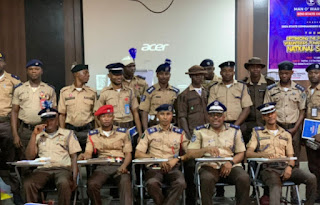Don't equate culture with religion, EPIA urges Edo indigenes
- Get link
- Other Apps
By Isaac Eranga
Benin City: The Edo Indigenous Movement (EIM) also known as Edo Progressive Indigenous Association (EPIA) has called on Edo indigenes to explore the rich cultural values for societal development irrespective of religious differences saying culture is different from religion.
This disclosure was made recently in Benin City by the President and Founder of EPIA- Chief Dr Bishop Omogiade Enoyiogiere Edokpolo while highlighting the role of culture in societal development. He said culture is the distinctive pattern a particular people is known with. This to him include mode of dressing, ways of cooking, ways of greeting, etc.
The Indigenous Leader said culture refers to the collective knowledge existing in the people of a society. He quoted Cristina De Rossi, an anthropologist at Barnet and Southgate College in London, as saying that culture shares its word history with the French word also termed culture derived from the Latin term colere which means “to nurture the earth”, and other words with meanings related to the cultivation of growth.
"Culture is the social heritage of every person which includes the knowledge they have acquired from years of being together in one particular society. When one fully comprehends the concept of culture, he or she can easily determine why people in one area behave in a certain way that they always do.
"People usually ask why a certain society dresses up this way, speaks that way, believe and practice this or that. Culture definitely answers all these in a perfect sense. The reason why people exhibit particular traditions and customs in their community is because of culture that is their shared knowledge.
"When it comes to the material aspect of culture, the people’s mechanisms and relics are also included as these things reflect what their culture really is in a given society. To add to the list of things that mirror culture are the people’s language, architecture, clothing, greetings or interactions with other, eating habits and other traditions. In other words, culture hints us on how these people refine themselves to perfection through the passing years.
"However, the things mentioned earlier are just the physical part of a certain culture. What really is closer to the cultural view of humanity is how the people become aware of themselves. This knowledge is acquired and not just a genetic result that develops at birth. This means that every person in a society establishes familiarity with the happenings around him and eventually develops it into tradition. That is what constitutes culture which includes religion as one of its many subsets.
The Indigenous leader described religion as a believe in a supernatural being whom they give allegiance to in order for them to be protected and for provision of daily needs.
"Religion is the relationship of every individual to the spiritual things they have regarded as holy and worthy of their highest reverence. It is also considered as the means that brings comfort to the people whenever they deal with the truth of life and death and anything in between. Many of the religions in the world highly observe their sacred texts as the authority and guide for spiritual and moral conducts.
"Most concerns known as prayers of religious people are directed to the gods and spirits they believe in. They perform in religious activities such as meditations and rituals mostly done in institutions also participated by other believers and worshipers. Because of this, religion has become the backbone of most people in every society even at the onset of those times when animism was prevalent", said the Edo Indigenous leader.
Differentiating between culture and religion, Dr. Omogiade Edokpolo said many culture is a body of knowledge that is acquired by people through years of being together in one society, while religion is the belief system directed towards the supreme deity and yet this is something that may or may not be accepted by each person in a culture. He said two individuals may have the same culture and yet practice different religious. He went further to say that culture focuses on the human beings which is its social heritage, while religion is associated with the God or the Creator of the whole universe.
"Culture is concerned with the evolution of humans and their beliefs and practices. On the other hand, religion is wholly concerned with revelation that comes from the Supreme Being to the people. The existence of religion is formally written by men inspired by the spirits of God as history have it; while culture is more practical as the way people behave in a community shows what kind of culture they have", he added.
Chief Dr Bishop Omogiade Edokpolo called on Edo indigenes to join EPIA in promoting the culture of Edo people and to imbibe cultural imperatives in the upcoming generation in order for them to live a meaningful life. He said EPIA is a cultural group and not a religious group.
"On this note we call on all Edo Indigenous men and women worldwide to join hands with us to show case our culture in the upcoming Edo Indigenous Global Home Coming Festival in January 2022", said Dr. Edokpolo.
- Get link
- Other Apps




Comments